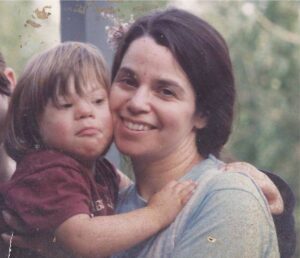When You’re Drenched in Tears
By Chaya Ben-Baruch
When I asked the doctors to play some recorded music during surgery, they replied that there was no stereo system in the operating room, so I proudly whipped out a walkman and earphones. I asked the anesthesiologist to talk to Avichai before the surgery so he would recognize his voice.
I’d been told that surgery done with biologically similar blood had a better recovery rate, so I asked to have blood I had already donated and which was awaiting the procedure in Fairbanks to be ferried to Portland.
In the middle of the night, I asked our “lollipop doc” about “What happens if…, and if you can use a Down Syndrome child’s body part to help others. And I drenched my baby in my tears…
Waiting to be called for surgery, I saw other parents anxiously waiting, whose children were also in line for surgical procedures that morning. The tension was palpable among all of the parents. I saw kids who “merely” needed tubes in their ears and wished I was in their parents’ place. When I kissed my son one last time before I handed his under seven-pound body over to the nurses, he smiled; I did not know if I would ever see him smile again. And, yet again, I drenched myself in my tears…
Miraculously we made it through surgery. The doctors, indeed, played music during surgery, and – since it was February 1992 and the winter Olympics were taking place in France – they shared with him who was winning the bronze, silver, and gold medals in downhill skiing and figure skating. Five days later we went back home.
We’ve had lots of adventures since then; I can spot a doctor and peg his specialty with 95% accuracy, and have cried oceans of tears, some for joy, many out of grief.
Today Avichai lives in his own home with Keren, his wife of nine years, who also experiences Downs Syndrome. They are under the supervision of a group home and an off-site support “mom.” Aside from his regular work in a factory twice a month, Avichai is an assistant to Mayor, Shuki Ohana, of Tzfat, in Israel’s northern Galilee, where I and my husband, Yisroel, have resided for three decades.
If someone had told me then that my son with Downs would get through open-heart surgery, work alone and unaided, be fluent in two languages, live an hour away from me in his own apartment, together with his wife, and assist our Mayor – well, that was not written in any book on Down Syndrome.
I am so grateful for all the people along the way who directly or indirectly supported our son and our family. Winnie the Pooh was correct: “You are braver than you believe, stronger than you seem, and smarter than you think.”
Neshikha supports and promotes inclusivity for special-needs people, awareness of the benefits of bees and other pollinators, and environmental activism and protection.
